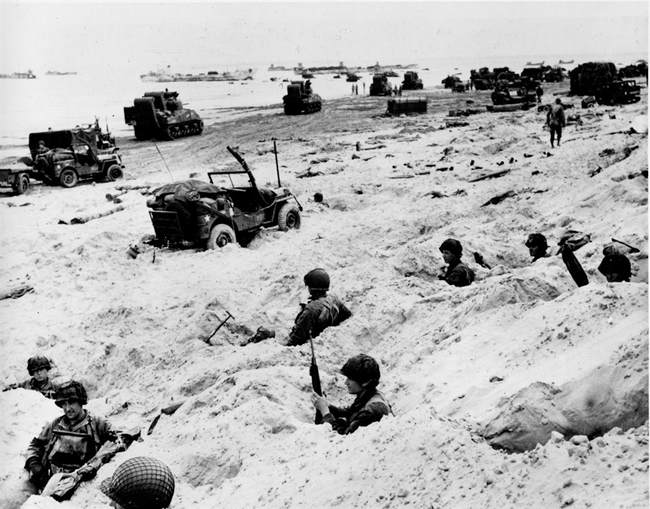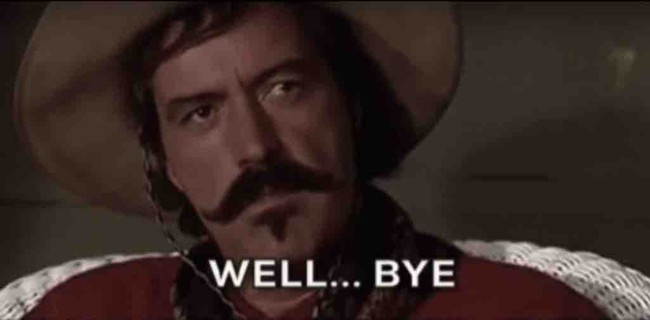
Share To Alt-Tech
This article was originally published on PJ Media - Culture. You can read the original article HERE

Eighty years ago today, on June 6, 1944, Allied troops waded ashore or parachuted from the sky to launch the invasion of Nazi-controlled Normandy, France. It would prove a pivotal turning point in the war, the beginning of the end for the Nazis, most especially because of the exceptional bravery of many American soldiers.
Advertisement
While D-Day itself was June 6, the operation lasted for weeks (partly because habitually incompetent generals like Eisenhower were in charge instead of Gen. George Patton). The Congressional Medal of Honor Society (CMOHS) lists ten brave U.S. military men who were awarded the Medal of Honor for their heroic actions at different points in the Normandy invasion: Pvt. Carlton William Barrett, Lt. Col. Robert George Cole, SSgt. Arthur Frederick DeFranzo, Pfc. Charles N. DeGlopper, SSgt. Walter David Ehlers, Pvt. Joe Gandara, First Lt. Jimmie W. Monteith Jr., T/Sgt. Frank D. Peregory, Technician Fifth Grade John J. Pinder Jr., and Brig. Gen. Theodore Roosevelt Jr. I am going to highlight three stories in particular of outstanding courage and intrepidity.
On June 8, the 3rd Battalion of the U.S. Army’s 116th Infantry was advancing on the German defenses at Grandcampe, France, which were strongly held. Suddenly, the leading elements came under devastating machine gun fire as entrenched Nazis on the high ground overlooking the town fired on them. Artillery and tanks could not neutralize the German position, but a single man accomplished what the heavy and deadly machines could not. That man was Tech. Sergeant Frank D. Peregory.
T/Sgt. Peregory, on his own initiative, advanced up the hill under withering fire and worked his way to the crest, where he discovered an entrenchment leading to the main fortifications 200 yards away. Without hesitating, he leaped into the trench and moved toward the emplacement. Encountering a squad of enemy riflemen, he fearlessly attacked them with hand grenades and bayonet, killed eight, and forced three to surrender. Continuing along the trench, he singlehandedly forced the surrender of 32 more riflemen, captured the machine gunners, and opened the way for the leading elements of the battalion to advance and secure its objective.
Advertisement
Very rightly does Peregory's citation refer to him as “extraordinary.” If Peregory’s heroic deeds were to be the subject of a movie, many people would no doubt consider them fictitious; that's how exceptional they were! But Peregory really did force the surrender or death of some three dozen Nazis all on his own. Sadly, this outstanding soldier died not long after in France on June 14, 1944, and his Medal of Honor was awarded posthumously.
First Lt. Jimmie W. Monteith Jr. landed on June 6, D-Day, with the first waves of the assault on the French coast as the Germans poured fire onto the incoming troops. Monteith, disregarding his own safety, went up and down on the beach so he could reorganize the troops. He then led an assault over a “narrow protective ledge” and onward across land that was flat and therefore exposed before they reached a cliff, which provided some shelter.
Retracing his steps across the field to the beach, he moved over to where two tanks were buttoned up and blind under violent enemy artillery and machine-gun fire. Completely exposed to the intense fire, 1st Lt. Monteith led the tanks on foot through a minefield and into firing positions. Under his direction several enemy positions were destroyed. He then rejoined his company and under his leadership his men captured an advantageous position on the hill. Supervising the defense of his newly won position against repeated vicious counterattacks, he continued to ignore his own personal safety, repeatedly crossing the 200 or 300 yards of open terrain under heavy fire to strengthen links in his defensive chain.
Advertisement
Unfortunately, the Germans managed to surround Monteith’s unit entirely. Monteith, trying to lead his men out of the deadly circumference, was killed by the enemy fire. He is cited for “courage” and “intrepid leadership” that is “worthy of emulation.”
On June 9, Staff Sgt. Walter David Ehlers repeatedly led his men in attacks on German strongpoints that were heavily defended, even under deadly fire. “Without waiting for an order, S/Sgt. Ehlers, far ahead of his men, led his squad against a strongly defended enemy strongpoint, personally killing four of an enemy patrol who attacked him en route,” CMOHS says. Ehlers proceeded to crawl his way forward despite a storm of machine gun fire and managed to put the gun crew out of action.
Turning his attention to two mortars protected by the crossfire of two machine guns, S/Sgt. Ehlers led his men through this hail of bullets to kill or put to flight the enemy of the mortar section, killing three men himself. After mopping up the mortar positions, he again advanced on a machine gun, his progress effectively covered by his squad. When he was almost on top of the gun he leaped to his feet and, although greatly outnumbered, he knocked out the position singlehandedly.
Nor did Ehlers’ heroics stop there. The next day, the platoon Ehlers commanded was deep into German-controlled territory and suddenly found themselves under increasing fire from mortars, machine guns, and small arms. The position of the platoon became untenable and it was ordered to withdraw. Ehlers’ squad covered the platoon’s withdrawal, and then he stood up and began shooting continuously at the enemy placements so that his squad could withdraw while he drew most of the fire.
Advertisement
At this point, though wounded himself, he carried his wounded automatic rifleman to safety and then returned fearlessly over the shell-swept field to retrieve the automatic rifle which he was unable to carry previously. After having his wound treated, he refused to be evacuated, and returned to lead his squad. The intrepid leadership, indomitable courage, and fearless aggressiveness displayed by S/Sgt. Ehlers in the face of overwhelming enemy forces serve as an inspiration to others.
More remarkably of all, Ehlers survived. He accepted his Medal of Honor in person and lived until 2014.
This is probably one of the last D-Day anniversaries where we have World War II veterans still living among us. Most of the men who survived the Normandy invasion, like my own great-uncle Jack Corley, have gone to their eternal reward. So today most especially we should pay tribute to the U.S. soldiers who risked everything to hand on a freer world to their children and grandchildren.
This article was originally published by PJ Media - Culture. We only curate news from sources that align with the core values of our intended conservative audience. If you like the news you read here we encourage you to utilize the original sources for even more great news and opinions you can trust!










Comments